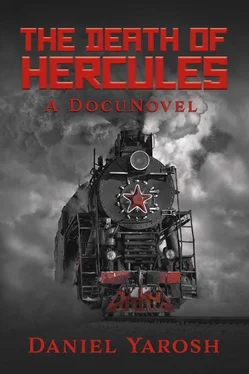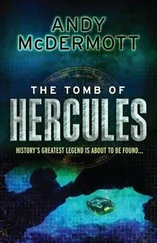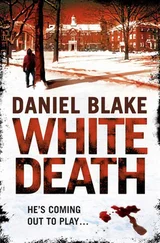Max turned from the window and said to him, “I am not afraid.” Zalmund nodded. “And I am not a fool,” Max continued. “My parents are in the East. My brothers and I decided, we have to get them out. I am going to bring my folks to America.”
He spoke with such sincerity that Zalmund was taken by emotion. But his lips pursed in control. How could he know of what he spoke? He was too young to know the possibilities, the situations that changed every day. Zalmund paused.
“Let me tell you my friend Max, everything is not all right in the East now that Germany is finished.” Zalmund narrowed his eyes. “You thought winning the War in the West was hard work? Many died? At least you knew who the enemy was. They were right in front of you in the trench. In the East? They are standing right next to you. They are across the table at dinner. They are in uniform and peasant clothes. You don’t know.”
“Zalmund,” Deena whispered. She didn’t like this lecturing tone. But Zalmund plowed on.
“So in the East, you have the dead Tsar, but he still has his White Army. Even without him you have the Polish noblemen and their Cossacks, and Ukrainian Nationalists and their Cossacks. They all have the help of your victorious western countries. Against them you have the Bolsheviks and their Red Army? Not just them, but the Socialists, who want a gentler revolution. They both oppose the Republicans, who want everyone to vote. And against anyone are the Anarchists, who want only local people without a government. Everyone has an army. And in the middle of all of this you have the Jews.”
“I understand,” Max said softly. “I am not interested in politics. I am going to get my parents. That’s all.”
Zalmund sighed and pursed his lips. “God bless you, Max. Ha-shem says in his fifth commandment that we should honor our parents. I pray that he protects you while you complete your mitzvah .”
Finally, the train pulled into the station at Köln. It was evening and dark, but the platform was filled with workmen and stacked wooden shipping boxes. The city was anticipating with dejection and humiliation the arrival of British occupation forces in less than a week. Lord Mayor Konrad Adenauer took some comfort that order might be maintained by a professional military force, and not left to the warring factions.
Zalmund and Deena rose and collected their suitcases from the rack above their heads. “Why don’t you join us for dinner tonight, dear Max?” Zalmund said. “We will take a room near the station. Tomorrow is another long day.”
Max was tired and accepted the invitation. He did not want to leave Deena’s sight.
On March 14, 1918 the unthinkable happened; the Russian Bolsheviks made peace with the Germans in the Treaty of Brest-Litovsk. It was no peace. These mortal enemies merely rearranged the destruction of the Continent. Within a month, Germany transferred one half-million men from Russia to the Western Front. It was cynicism mixed with clairvoyance. The Germans knew that in a short time the Bolsheviks would do more damage to Russia than the Germans could ever do. And they did.
Zalmund was a part of it. On a brisk Sunday in late April 1918, when the wind blew and more than leaves were in the air, when the Spring began to melt the snow from the streets of Lublin, Zalmund hurried past the shuttered shop windows down a narrow street of the old city. At the corner seven men jumped from the hay wagon onto the cobbled streets. The farmer tipped his hat to those he had taken from the train station and continued on. With their backs to the neo-Gothic castle that held the prison of Lublin, Zalmund and the raggedy group joined with hundreds more to form a crowd spilling out of the medieval square. They had come to the People’s Rally for Jobs, organized by Josef Kikulsky. Kikulsy was born in Vilnius, Lithuania and came to Poland in 1905 to organize the Revolution, but instead had spent 12 years in Polish prisons, most recently in the one behind them. Now, with the retreat of the Germans, the prisons had been opened and Kikulsky was free.
Josef Kikulsky strode to the top of a simple wooden platform, and the crowd crushed closer. He was stern and gaunt, with a receding hairline, forelock and a drooping goatee. His dark and narrow eyes were ablaze. As he began to speak, Zalmund forgot the cold wind that made his nose numb. Kikulsky began with the hardships of the people, and each in the crowd nodded. They knew hunger and cold, and were drawn in. He gave voice to their hopelessness and anxiety, and those crushed in the square shifted from side-to-side, and the heat rose among them. He spoke of the oppression, the unfairness, and Zalmund agreed. He, too, felt closed in, and condemned with no appeal, with nowhere to turn, his future a black pit of despair.
Kikulsky said “We have given our best men, our strength to Mother Poland, and we have no jobs, no bread to feed our babies!” Here and there, a tear formed, and a heart rose in the throat. Then he pointed his finger – the State, the authority, the police and the army. Now the enemy had a face. The venom of most Bolshevik speakers was exceptional, but that of Josef Kikulsky was in the extreme. Spittle flew from his lips onto the front row, that which didn’t dribble onto his goatee. He smote the air with his fist, condemning those who oppressed workers and imprisoned its champions. The tails of his woolen coat flapped with the wind, giving him a Biblical presence.
Zalmund was entranced. The gathering grew uneasy, and nervous electricity traveled from person to person. Kikulsky praised the courage of the Bolsheviks in taking Russia, and in their forethought in establishing the rule of the proletariat. He saw the same future for Poland. Restlessness rippled through the crowd. Zalmund smelled in the wind the musk of sweat in wool and horse dung. He was pushed from behind.
Prison had not taken the strength from Kikulsky. The veins bulged from his neck, and his raspy voice was heard throughout the square. Death to the oppressors, he roared, death to the imprisoned Tsar and all his vassals in Poland.
That was it. Police on horseback charged the square with drawn swords. The crowd collapsed in front of hooves, and Zalmund was knocked to the ground. He flung aside the gangly student who had fallen on his legs and pushed his way to the stage. The horses waded into the people, who were encircled and could not disperse. The police were frightened, and several struck with their swords. Blood spattered the face of a young woman, who only now realized that she was not made for revolution. In the next moment she was trampled. By then Zalmund reached the stage, and with perhaps twenty other husky men, they surrounded Kikulsky. In a turtle-shaped formation, they shuffled together toward the perimeter, pushing aside or kicking the remnants of the crowd. A mounted officer broke through at the point where Zalmund stood linked arm in arm with comrades. As the policeman drew up his sword, Zalmund wrapped his long coat around his forearm, just in time to take the brunt of the saber as it came down. Another flung his coat over the attacker’s head, an in a moment they had him off the horse. They stomped him until he no longer moved. When Zalmund looked up, Kikulsky was gone.
Later that afternoon, Zalmund crouched in an abandoned room off a side street from the square. Several others from the melee examined his forearm, which was bruised but not cut. In hushed tones they praised him, slapping his back. Their tones showed more relief than bravery. Zalmund himself took a deep breath. A few candles lighted the room, and men sat or squatted against the plaster walls. The straw on the floor was dank, and the smell was mixed with the smoke of rough Russian cigarettes inhaled by a few. Two men stood watch, peering through a crack in the single window covered by planks. Suddenly they stiffened, and with great silent animation signaled the two men standing by the single door barred with a thick timber. The two grasped the ends and lifted the timber from the iron clasps and opened the door.
Читать дальше












